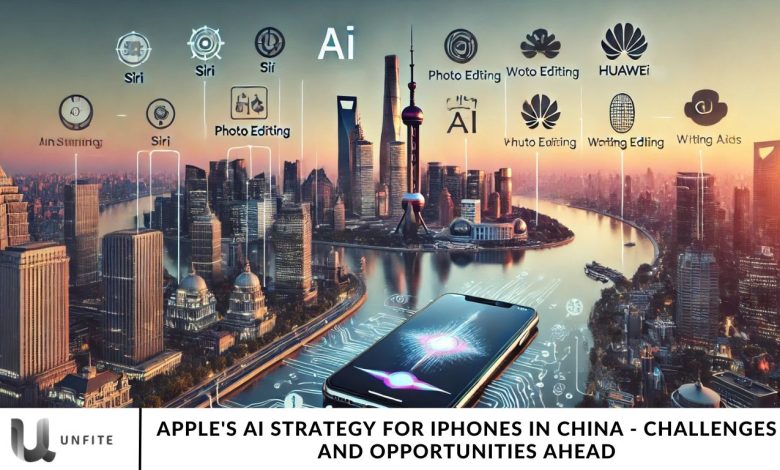Apple’s AI Strategy for iPhones in China – Challenges and Opportunities Ahead

Apple is encountering significant challenges in China when launching its AI model, Apple Intelligence. Due to regulatory hurdles, the rollout may be delayed.
Chinese authorities require foreign companies to navigate an extensive approval process unless they partner with local firms. It remains to be seen how Apple will address these complexities and adapt to the stringent requirements.
This blog delves into Apple’s AI strategy for iPhones in China, exploring the complexities and challenges that make the journey long and arduous.
Apple’Apple’srategy for iPhones in China
Apple has introduced several AI features in iPhones and other devices in the US and now plans to launch its large language models (LLMs) in China.
The company is focused on enhancing Apple Intelligence to provide users with upgraded capabilities and access to innovative features in the latest iPhone models.
Regulatory and Geopolitical Challenges

Tim Cook visited China for the third time this year to learn about the complexities foreign companies face and explore how Apple Intelligence could be introduced to Chinese users.
However, Chinese regulators require foreign companies to undergo a lengthy approval process unless they partner with local firms. This suggests a clear preference for foreign companies to adopt existing LLMs developed by Chinese tech groups.
Apple faces stiff competition from Huawei, which has already launched generative AI capabilities in its devices. To gain a foothold, Apple has been in discussions with companies like Baidu, ByteDance, and Moonshot for potential partnerships.
China, Apple’s critical market with a 17% share, has seen an 8% drop in sales compared to the previous year, raising concerns about its market presence. This decline may also stem from ongoing campaigns discouraging iPhone use amid strained US-China relations.
Understanding ApplApple’sVision
What is Apple Intelligence and Its Global Rollout?
Overview of Apple Intelligence and Its Features
Apple Intelligence is a sophisticated AI-driven system designed to enhance user experience across Apple devices. It powers features like Siri voice recognition, advanced photo editing tools, writing aids, and custom emojis. The system seamlessly integrates on-device processing with Apple servers, ensuring both privacy and efficiency.
How Apple Intelligence is Implemented in the US and Other Markets
In the US, Apple Intelligence is widely implemented, offering users personalized and intuitive interactions. Siri leverages AI to provide more thoughtful responses, while photo editing tools use machine learning for precise adjustments. Writing aids powered by AI assist in grammar and sentence suggestions. These features are expanding globally, tailoring to the needs of local markets and user preferences.
Why China is Crucial Apple’sle’s AI StratChina’s
China’s Importance as a Market
China is a significant player in Apple’s global operations, accounting for 17% of its total market share. It remains one of the largest consumer bases for iPhones and related products. However, recent sales have dipped by 8%, making it essential for Apple to regain momentum through innovative offerings like Apple Intelligence.
The Potential Benefits of Introducing Advanced AI Features in China
Integrating Apple Intelligence into iPhones in China can revolutionize user experiences. Features like localized Siri commands, intelligent photo editing for cultural nuances, and robust on-device privacy could strengthen Apple’s foothold in the market. By addressing local user needs, Apple can not only compete with domestic brands like Huawei but also rebuild customer loyalty in this competitive market.
Challenges in Launching Apple Intelligence in China

Regulatory Roadblocks for Foreign Tech Companies
The Complex Approval Process for Introducing AI in China
China has established stringent regulatory requirements for foreign tech companies looking to introduce AI-driven models. Companies must undergo an extensive and time-consuming approval process to ensure compliance with local laws. These regulations are designed to maintain strict control over AI technologies entering the market.
Requirement for Partnerships with Local Companies
Foreign companies are often encouraged to collaborate with local Chinese firms to expedite approvals. Such partnerships facilitate smoother integration and ensure alignment with Chinese regulatory standards. For Apple, forming alliances with local companies could be a pivotal strategy to overcome these roadblocks and bring Apple Intelligence to Chinese users.
Competition with Domestic Huawei’s
Huawei’s Advancements in Generative AI
Huawei, Apple’s Apple’s primarcompetitorrs in China, has already launched generative AI features in its devices. These advancements provide users with cutting-edge capabilities, making Huawei a formidable rival in the AI-driven smartphone market.
Other Local Competitors: Baidu, ByteDance, and Moonshot
In addition to Huawei, companies like Baidu, ByteDance, and Moonshot are driving innovation in the AI space. These domestic players have a deep understanding of local consumer needs and regulatory frameworks, giving them a competitive edge. For Apple, competing against such established brands requires a strategic approach, including possible collaborations.
Geopolitical Tensions and Their Impact
How Strained US-China Relations InApple’s Apple’s Market Presence
The ongoing trade tensions between the US and China have created challenges for American companies operating in the region. Apple, being a high-profile US brand, faces scrutiny and obstacles that can impact its ability to maintain its market share.
Campaigns to Reduce iPhone Usage Among Chinese Officials and Consumers
Amid these tensions, campaigns have emerged urging Chinese officials and consumers to reduce their reliance on iPhones. Such initiatives, coupled with increased support for domestic brands, pose a significant threat to Apple’s market position in China. Overcoming these challenges requires Apple to innovate and foster positive relationships within the Chinese market.
Frequently Asked Question
What is Apple’Apple’srategy for iPhones in China?
Apple’s strategy for iPhones in China focuses on introducing AI-driven features, such as Apple Intelligence, to enhance user experience. However, to successfully roll out these features in China, Apple must navigate local regulatory hurdles, competition from domestic brands, and geopolitical tensions.
Why is China an important market for Apple’s AApple’satives?
China is a critical market for Apple, accounting for 17% of its global sales. With a massive consumer base and the growing demand for advanced technology, China presents significant opportunities for Apple to expand its AI-powered features and solidify its presence in the region.
What AI features is Apple planning to bring to China?
Apple plans to integrate several AI-powered features, such as Siri, intelligent photo editing, writing aids, and custom emojis, into Apple Intelligence. These features will be tailored to Chinese users’ needs and preferences, providing a more localized experience.
What regulatory challenges is Apple facing in China?
Apple faces a complex approval process for introducing AI features in China. Foreign companies must comply with strict regulations and, in many cases, partner with local Chinese firms to navigate this process and gain approval for their technologies.
How does China’s regulatory environment China’sApple’s AI rollout?
China’s regApple’s environment China foreign companies undergo lengthy approval processes unless they partner with local companies. This has created obstacles for Apple’s AI expansion, as the company either complies with local regulations or forms strategic partnerships to proceed.
Who are Apple’s main competitors in the Appler A market?
Apple competes with several local tech giants in China, including Huawei, which has already introduced generative AI in its devices, and other companies like Baidu, ByteDance, and Moonshot. These competitors have a deep understanding of local consumer preferences and regulatory standards.
How does Huawei’s AI technology compare to Huawei’s?
Huawei has advanced its application’s AI capabilities within its devices, offering AI-powered features such as virtual assistants and more innovative content creation tools. Apple must innovate and tailor its offerings to differentiate itself from Huawei and other local competitors in the Chinese market.
How are geopolitical tensions between the US and China affecting Apple’s AI strategy?
Strained UApple’s relations have created challenges for American companies, including Apple, in China. These tensions have led to increased scrutiny of Apple’s products and campaigns. Apple’s iPhone usage among Chinese consumers has been launched, which could negatively impact Apple’s market share.
Conclusion
Apple’s AI strategy for iiPh iPhones presents significant challenges and exciting opportunities. While the company faces regulatory hurdles, intense competition from domestic giants like Huawei, and the impact of geopolitical tensions between the US and China, there are still substantial prospects for growth.
By localizing its AI features, partnering with Chinese firms, and navigating the complex approval processes, Apple can tap into China’s vast consumer market. IChina’s can overcome these obstacles, its advanced AI offerings could resonate well with Chinese users, potentially reinvigorating its market share in a region that is critical to its global strategy. However, how well Apple adapts to these challenges will determine its success in this crucial market.




